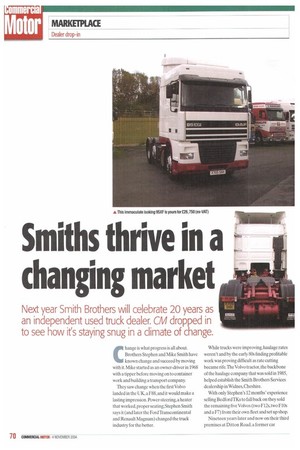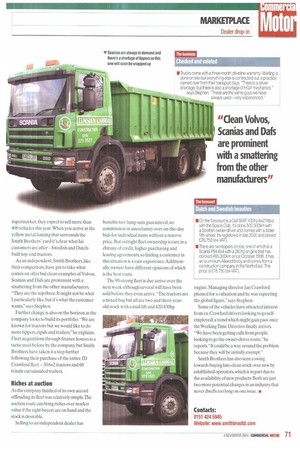• Smiths thrive in a changing market
Page 72

Page 73

If you've noticed an error in this article please click here to report it so we can fix it.
Next year Smith Brothers will celebrate 20 years as an independent used truck dealer. CM dropped in to see how it's staying snug in a climate of change.
Change is what progress is all about. Brothers Stephen and Mike Smith have known change and succeed by moving with it. Mike started as an owner-driver in 1968 with a tipper before moving on to container work and building a transport company.
They saw change when the first Volvo landed in the UK, a F88, and it would make a lasting impression. Power-steering, a heater that worked, proper seating; Stephen Smith says it (and later the Ford Transcontinental and Renault Magnum) changed the truck industry for the better. While trucks were improving, haulage rates weren't and by the early 80s finding profitable work was proving difficult as rate cutting became rife. The Volvo tractor, the backbone of the haulage company that was sold in 1985, helped establish the Smith Brothers Services dealership in Widnes, Cheshire.
With only Stephen's 12 months' experience selling BedfordTKs to fall back on they sold the remaining five Volvos (two F12s, two FlOs and a F7) from their own fleet and set up shop.
Nineteen years later and now on their third premises at Ditton Road, a former car supermarket, they expect to sell more than 400 vehicles this year. When you arrive at the yellow metal fencing that surrounds the Smith Brothers' yard it's clear what his customers are afterSwedish and Dutchbuilt top-end tractors.
As an independent, Smith Brothers, like their competitors, have got to take what comes on offer but clean examples of Volvos, Scanias and Dafs are prominent with a smattering from the other manufacturers. "They are the top three. It might not be what I particularly like, but it's what the customer wants," says Stephen.
Further change is also on the horizon as the company looks to build its portfolio. "We are known for tractors but we would like to do more tippers, rigids and trailers," he explains. Fleet acquisitions through finance houses is a tactic used before by the company but Smith Brothers have taken it a step further following their purchase of the entire JD Crawford fleet -30 6x2 tractors and 60 triaxle curtainsided trailers.
Riches at auction As the company finished of its own accord offloading its fleet was relatively simple.The auction route can bring riches over market value if the right buyers are on hand and the stock is desirable.
Selling to an independent dealer has benefits too: lump sum guaranteed, no commission or uncertainty over on-the-day bids for individual items without a reserve price. But outright fleet ownership is rare in a climate of credit, higher purchasing and leasing agreements, so finding a customer in this situation is a rare experience.Additionally owners have different opinions of which is the best route.
The 90-strong fleet is due arrive over the next week although several will have been sold before they even arrive. -The tractors are a mixed hag but all are two and three-yearold stock with a mid-lift and 420/430hp engine. Managing director Ian Crawford phoned for a valuation and he was expecting the global figure," says Stephen.
Some of the vehicles have attracted interest from ex-Crawford drivers looking to go selfemployed; a trend which might gain pace once the Working Time Directive finally arrives. "We have been getting calls from people looking to go the owner-driver route," he reports. "It could be a way around the problem because they will be initially exempt."
Smith Brothers has also seen a swing towards buying late-clean stock over new by established operators, which is in part due to the availability of new products. Both are just two more potential changes in an industry that never dwells too long on one issue. •






























































































































































































